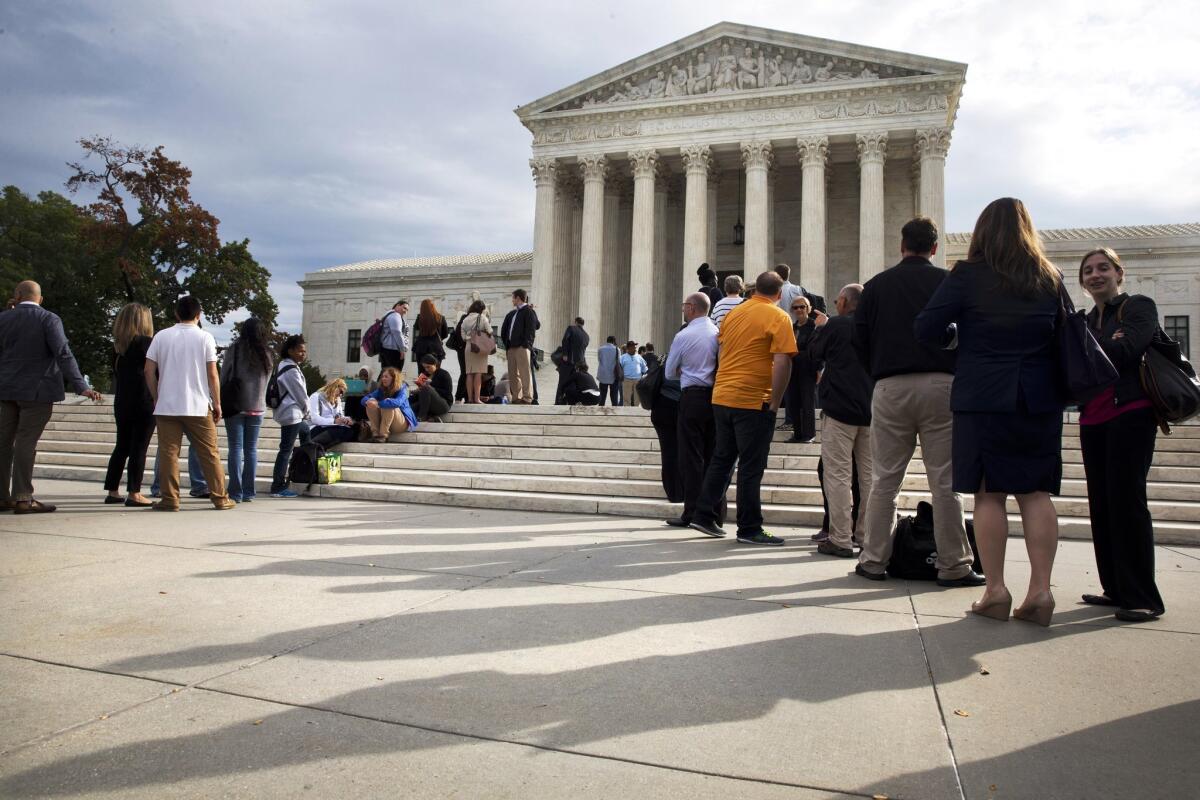Supreme Court says prisoners sentenced as juveniles to life without parole can seek new reviews

People line up outside of the Supreme Court on Oct. 13, 2015, as the justices begin discussing prisoners who were sentenced as juveniles to life without parole.
Reporting from Washington â The Supreme Court opened the door Monday to possible parole for hundreds of aging prisoners across the nation who are serving life terms for homicides committed when they were under age 18.
In a 6-3 decision, the justices said these prisoners can take advantage of an earlier ruling that called it cruel and unusual punishment to send a juvenile criminal to life in prison with no chance for parole.
Since then, California and most other states have given such prisoners a new sentence or provided them with a right to seek parole. But several states, including Michigan, Pennsylvania and Louisiana, have refused to reopen these old cases.
Mondayâs decision gave new hope to a 69-year old Louisiana inmate who shot and killed a police officer in Baton Rouge in November 1963, days before President Kennedy was assassinated in Dallas. Henry Montgomery was 17 then and was sentenced to life in prison with no chance for parole.
Justice Anthony M. Kennedy has played the key role in a series of decisions that have restored the principle that young offenders should not be treated the same as hardened adult criminals.
In Mondayâs opinion, he said these prisoners do not have an automatic right to go free, but they do have a right to a parole hearing or a new sentence that limits their prison terms.
See more of our top stories on Facebook >>
âHenry Montgomery has spent each day of the past 46 years knowing he was condemned to die in prison,â Kennedy said. âPerhaps it can be established that, due to exceptional circumstances, this fate was a just and proportionate punishment for the crime he committed as a 17-year-old boy.â
But âchildren are constitutionally different from adults in their level of culpability,â and âprisoners like Montgomery must be given the opportunity to show their crime did not reflect irreparable corruption, and if it did not, their hope for some years outside prison walls must be restored.â
His opinion in Montgomery vs. Louisiana was joined by Chief Justice John G. Roberts Jr. and Justices Ruth Bader Ginsburg, Stephen G. Breyer, Sonia Sotomayor and Elena Kagan.
Kennedy spoke for the court in 2005 when the justices abolished the death penalty for juvenile murderers, and again in 2010 when life terms for juvenile offenders, except for those convicted of murder, were deemed cruel and unusual punishment.
NEWSLETTER: Get the dayâs top headlines from Times Editor Davan Maharaj >>
Four years ago, the court in an Alabama case said that even young offenders convicted of homicide should be rarely, if ever, sentenced to a life term with no chance for parole. But at the time, the court did not say whether its ruling must apply retroactively to old cases, the issue that was resolved Monday.
Justices Antonin Scalia, Clarence Thomas and Samuel A. Alito Jr., who disagreed with the earlier rulings, dissented on Monday.
ALSO
Supreme Court strikes down Floridaâs death penalty system
Supreme Court to decide corruption case of former Virginia Gov. Bob McDonnell
Supreme Court should recognize the presidentâs power to defer the deportation of immigrants
More to Read
Sign up for Essential California
The most important California stories and recommendations in your inbox every morning.
You may occasionally receive promotional content from the Los Angeles Times.










